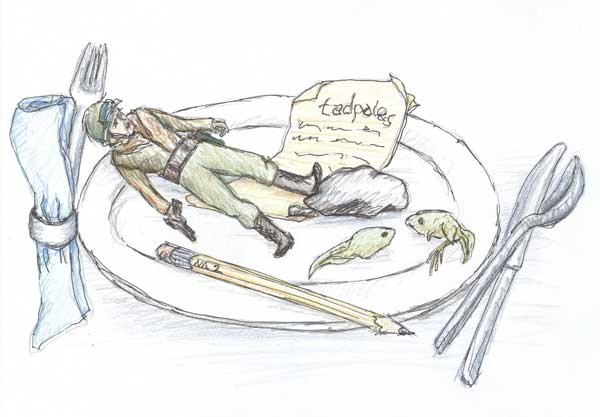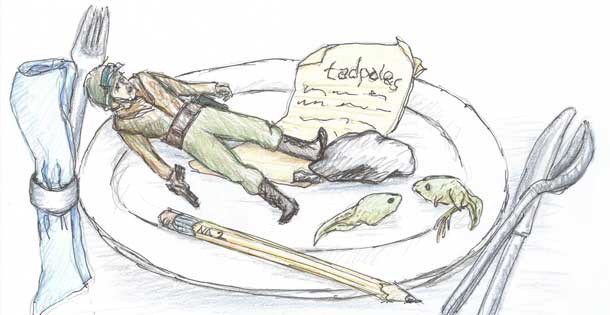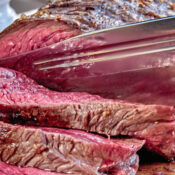
The fact of the matter was, I didn’t have anyone else to blame. So I blamed Roscoe–perhaps ill-advised, him being my father’s K-9 partner-in-waiting, but I had completely forgotten my homework. I wasn’t in the habit of lying or putting blame where it didn’t belong, but I was caught off guard–daydreaming about Roscoe, in fact. My third grade teacher now loomed over my desk, expectant, her hand outstretched, fingers wiggling. And in my deer-in-the-headlights stare, with Miss Underwood frowning down at me, the words blurted out all on their own.
“Roscoe ate it.”
“What?” Miss Underwood scowled more, if that were possible. She planted her fists against her ample hips and leaned in, hovering over me.
I blinked, swallowed a spitless lump in my throat, and having already lied, promptly repeated myself. “Roscoe ate it,” I said with slightly more conviction.
Miss Underwood stood stiff, smack dab in front of my desk, so close I should have been able to smell the little flowers on her dress. I had an overpowering impulse to move away from her, but my chair shackled me to the spot. I stared at the vibrant gladiola sprouting out from beneath Miss Underwood’s belt, and felt the entire class’s attention span shake from all else and swoop down on me.
“Mister Pike. You are not lying to me, are you?” It was more a challenge than a question.
Miss Underwood absolutely terrified me–almost as much as did the prospect of acquiring the entire class’s ridicule or getting caught in a bald-faced lie–and such terror can be a remarkable survival mechanism, because my brain spun a web and my mouth spewed it out without so much as consulting with me. I sat, breathless and rapt with the rest of the class, listening to this story unfold.
“Oh, no ma’am,” a voice–my voice–poured out of me, my brain, frenetic, only barely keeping a syllable ahead of my mouth. “I wrote my report on the metamorphosis of tadpoles into frogs,” I heard. (It was a good thing I had recently become fascinated by this amphibious process and had not only been reading about it but observing it in the natural setting of our backyard.) “And I took the paper with me to the pond so that I could look at them and draw pictures to show the stages, and Roscoe came with me, and I had a tadpole on the top of the paper so I could trace it and Roscoe saw it and before I knew what happened he jumped on it and swallowed it whole, and the paper.”
I shifted my bug-eyed gaze up the floral landscape to the teacher’s face. Miss Underwood remained completely still.
“And the rock that I had holding the paper down,” my voice said. Her eye twitched, barely perceptible. “And the pencil I was using.” Her brows drew closer together. “And then it was dark, and I couldn’t draw them again, and then I had to do my chores and it was time for bed.”
Miss Underwood frowned, unwedged one hand from her hip and pointed at my chest. “You’d better be sure to get that dog to the vet, young man.”
“Yes, ma’am.” I nodded vigorously. “We’re taking him this afternoon.”
“Good,” she said. “And re-write your report and bring it in tomorrow. Along with a report on how Roscoe did at the vet’s.”
“Yes, ma’am,” I said, and wondered if the pittance I had in the Mason jar under my bed could buy me a plane, train, or boat ticket anywhere else in the world.
*****
That afternoon, when I slouched from the school bus, Roscoe careened down the driveway to meet me, his half-grown legs all knobs and paws flying indiscriminately; he seemed none the worse for wear for his “misadventure” of the day before. I trudged up the driveway, the pup orbiting around me, bounding and panting, pausing only to wolf down my mother’s lone remaining gladiola. While my reporting of late had been very light on honesty, there was truth to the fact that Roscoe was a one-canine mauling, gulping, devouring, completely-nondiscriminatory eating machine. The gladiolas, much to my mother’s dismay, had vanished into his maw during a single galumphing frenzy; this was shortly after Roscoe had discovered the infinite wonders that the frog pond in the backyard held. Mom had admonished my father to restrain the dog. Dad had testified that socialization was critical to Roscoe’s mental development and future as a police dog. Mom declared her flowers unfair casualties. Dad promised to build a fence for her gardens (a moot point, as Roscoe had already decimated them).
The sound of my mother’s footsteps on the porch drew my attention; I looked up to see Roscoe gleefully caprioling by her side. She had her arms crossed over her chest, and was staring at me with an expression that immediately made me slow my already lethargic trudge.
“I hear Roscoe ate your homework,” she said. There was no tone of accusation or belief–or even disbelief, for that matter–just a simple statement. I stopped and looked up at her, and for two ticks of a heartbeat I was on the verge of coming clean. I steeled myself to admit my lie, to face the consequences, and to be a better man for it. During those two ticks of a heartbeat, Roscoe splayed himself on the porch and latched onto one of the banister posts, gnawing and grunting.
“Yes ma’am,” I said, and felt the heat rise under my collar as I lied to my own mother. I looked intently at Roscoe (who supported my story with his every action) to avoid looking in my mother’s eyes. I heard her sigh.
“Well, alright then. I called Dr. Brown’s office as soon as Miss Underwood phoned me, so let’s get things together and get going. Hopefully, he’ll be fine; it’s that rock I’m worried about.”
I nodded and walked up the porch steps, head down and ashamed, and slipped past my mother, past the squirming, euphoric mass of German shepherd enthusiasm. My mother stayed on the porch while I dropped my book bag on the kitchen table. Roscoe leapt up, flung himself against her legs. Out of the corner of my eye, I saw her reach down idly and rub his head. He gazed up at her adoringly, his tongue lolling out of his mouth, wood splinters flecking his lips; his tailed swished nonstop across the porch.
“Maybe the paper and rock and all just went right through him,” I said, and hoped that if a dog actually were to eat a paper and a rock, they might actually move right along. Otherwise, I was going to be busted when the vet checked the dog out and declared him devoid of foreign objects. Not that I wanted him to have a problem; I didn’t, but his clean bill of health was my sentence. Granted, it was of my own making.
“I hope so,” Mom’s voice came in from the porch. I heard her add, under her breath, “Roscoe, you’re going to be the death of me if you live long enough.”
*****
In the vet’s waiting room, I studiously worked on my tadpole-to-frog report, shielding it from Roscoe, who my mother worked up a sweat restraining. And when it was finally his turn to go in and be examined, and I was left with silence and the weight of my own guilt, I could barely remember the details of amphibian metamorphosis, much less write about them. Mom, quiet, read a paperback. The clock on the wall ticked off five minutes, 10, 15; the smell of the waiting room mixed with the odor of wet dog, cat pee, and rodent cage litter, and I began to feel nauseous.
“How’s your paper coming?” Mom asked. I shrugged. I sweated.
I was nearly to the point of breaking down and admitting my guilt, or at least bolting from the waiting room and into the parking lot, when Dr. Brown summoned us. Mom clutched her purse, and I drooped behind her, a condemned man going to the gallows. The vet brought us into the execution chamber, and closed the door. The harsh florescent lights gleamed, ruthless and all-seeing. Roscoe was not in the room to witness my punishment.
Dr. Brown cleared his throat. I felt a prickling thrill of sweat, and stared fixedly at the poster of canine parasites on the wall. “Well, we took x-rays of Roscoe, and we don’t see your rock or your paper.”
I couldn’t help a fleeting glance at the vet; he met my eyes for a beat, then looked over at Mom. “But it’s a good thing you brought him in, because we did see something else.”
I blinked, confused.
“Oh?” my mother said.
Dr. Brown turned his back to us, popped a thick sheet of film against a panel, and turned on the light behind it. Ribs and spine and gray masses flickered to light. Dr. Brown glanced over his shoulder toward us. Both Mom and I leaned toward the glowing image. Dr. Brown cleared his throat again and pointed to something in the middle of the picture. I looked closer, squinted, and then with a sting of recognition, I understood the image on the screen. My mother realized at the same time, and she chuffed, glancing sidelong at me.
“This,” Dr. Brown said, tapping the image of my G.I. Joe, recently MIA, “needs to come out. And it won’t come out the easy way like that rock did,” he glanced down at me again. “It will snag other things he swallows, and you’re going to have a bad emergency situation, maybe a dead dog.”
My mother reached for the collar of her blouse, pressed her hand flat. “Oh, no. Oh, poor Roscoe!”
My skin prickled again, but I wasn’t worried about my guilt and punishment anymore. “Will he be okay?” My voice sounded tiny and tremulous. “He won’t really die, will he?”
Dr. Brown smiled then. “No, I think we got him in time. We’ll put him on the surgery schedule for the morning, and he should be right as rain in a month’s time.” He reached a hand out and ruffled my hair. I realized I was crying. “In a way, it’s a good thing he ate your homework, otherwise you might not have found out about this until it was too late.”
I looked up at him lamely.
*****
That weekend, Dad fenced off what was left of Mom’s gardens, I patrolled the entire house and yard and commandeered all swallowable objects (and even some that didn’t seem swallowable), and my folks and I discussed the new obedience regimen for Roscoe. When he came home a few days later, belly shaved but none-the-worse for wear, I doted on him and chaperoned him vigilantly. After a short period of gorging withdrawal, Roscoe adjusted gleefully to his obedience training, and was already ahead of the learning curve when he officially entered his police-dog training.
I was too ashamed to ever admit to my parents my panic-induced homework fabrication. I like to think that the guilt and anxiety I experienced for that long afternoon was punishment enough, and sometimes, I also like to think that it was all part of the plan for Roscoe’s long and decorated life. I like to think that, but I don’t believe it much more than Miss Underwood believed me.
Become a Saturday Evening Post member and enjoy unlimited access. Subscribe now




Comments
I love reading K. Donley’s fiction & non fiction. There is always an element of curiosity and expectancy that keeps my attention and wanting to discover. Her sentences are like little paintings that color and shape the atmosphere and lend to the feeling of actually being “there.” Keep writing K. Donley!